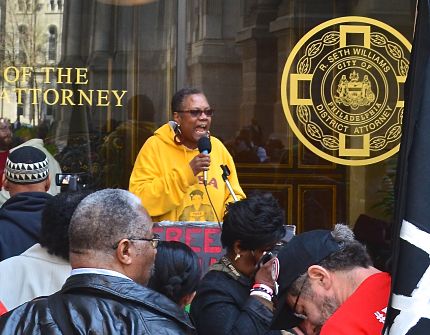Philadelphia District Attorney Seth Williams, the top prosecutor with a tarnished reputation for turning a blind-eye to following ethics rules, has clearly seen the proverbial handwriting on the wall.
Williams, a few days ago, announced that he would not seek reelection to a third term. That surprise announcement evidenced belated recognition by Williams that his quest for reelection would be an uphill struggle if not an impossible mission thanks to fallout from his many ethical failings and questionable practices, as well as ongoing criminal investigations into his finances by the FBI and IRS.
That DA career-ending announcement by Williams came weeks after Philadelphia’s Ethics Board slapped this once promising and popular politician with a $62,000 fine for his failure to file mandatory financial disclosure forms for five years. His fine – the largest ever levied by Philadelphia’s Ethics Board – faulted Williams for not reporting over $160,000 in gifts that included fancy vacations and expensive jewelry, including from attorneys with clients prosecuted by Williams’ office.
Williams claimed, improbably, that he merely forgot to file the mandatory disclosure forms from 2010 to 2015.
But that claim fails the laugh test because Williams once served as Philadelphia’s Inspector General, the post tasked with ethics rule enforcement. During his announcement about withdrawing from reelection, Williams apologized for the embarrassment and shame he brought on the District Attorneys Office.
Williams’ re-election prospects were already in doubt due to erosions of support among his core constituency in the black community and his calculated ultimately unsuccessful effort to cultivate support from Philadelphia’s police union. That labor organization, the Fraternal Order of Police, has a history of reflexively backing police brutality and misconduct that primarily impacts blacks in the so-called City of Brotherly Love.
In recent weeks the FOP launched attacks on Williams arising in part from his decisions not to prosecute civilians who had questionable confrontations with police officers. Those FOP attacks included an anti-Williams billboard on the major interstate highway that runs through the center of Philadelphia.
 DA Williams with Philly FOP prez in better times.
DA Williams with Philly FOP prez in better times.
Meanwhile, Philadelphia’s NAACP branch recently blasted Williams for failing to prosecute three white men involved in a fatal building collapse while gaining the convictions of two poor black men connected with that incident. A civil trial jury in that building collapse recently found that the men Williams refused to prosecute were most responsible for that fatal incident. That jury verdict produced a settlement providing nearly a quarter of a billion dollars in damages to victims of that collapse.
Williams was already under fire in Philadelphia’s black community for his prosecution of five black state representatives for their failure to report gifts on financial disclosure forms –- the same failure that Williams committed which led to his record-setting Ethics Board fine.
The total value of all ‘gifts’ received by those five legislators was less than half of the value of just one gift Williams received in 2013: $45,000 worth of roofing repairs on his home.
Autopsies of Williams’ fall from grace in Philadelphia’s news media fail to note a failing that produced international condemnation of this top prosecutor: his repeated, gratuitous assaults on imprisoned Philadelphia journalist Mumia Abu-Jamal, a Philadelphia journalist widely considered to be an American political prisoner because of how politically corrupted his trial and appeals process has been.
One such assault came in early 2014 when DA Williams, a Democratic, aligned himself with Tea Party Republican Pennsylvania U.S. Senator Pat Toomey to help torpedo President Obama’s nomination of a respected lawyer to head the Civil Rights Division of the U.S. Justice Department.
The national police union had falsely accused Obama nominee Debo Adegbile of having successfully freed Abu-Jamal from death row when Adegbile worked for the NAACP Legal Defense Fund. The National FOP harped on Abu-Jamal as a “cop killer.”
However, the lawyer whose courtroom arguments resulted in federal court rulings producing the conversion of Abu-Jamal’s death sentence into a life in prison term was not Adegbile but a law school professor who represented Abu-Jamal years before the LDF had even joined Abu-Jamal’s appeal.
The national FOP used Abu-Jamal as a bogey man to mask the true intent of its opposition to Adegbile: fear that Adegbile would continue Obama Administration efforts to address rampant police abuses.
 Pro Abu-Jamal protestors outside office of DA Williams. LBW Photo
Pro Abu-Jamal protestors outside office of DA Williams. LBW Photo
The FOP letter that Seth Williams, Toomey and their U.S. Senate confederates seized upon to slam Adegbile clearly stated that organization’s concern that Adegbile would “certainly exacerbate” the Obama Administration’s “aggressive and punitive approach towards” police.
The national FOP bristled at the Justice Department’s investigation of errant police departments despite the fact that those investigations only produced recommendations for reforms not prosecutions of abusive officers or funding cuts for departments with persistent patterns of brutality.
DA Williams, hailing from a city with a history of police brutality, backed the national police union’s efforts to scuttle federal oversight of abusive policing. Williams’s actions against Obama’s nominee provided more evidence to critics who claimed he has an anti-black streak.
Rufus Seth Williams entered office in January 2010 with widespread support. Yet the actions and inactions of the first black to serve as the District Attorney of Philadelphia soon turned even avid supporters into ardent critics.
Williams, for example, campaigned for office in 2009 as an opponent of the death penalty. Yet, Williams bitterly castigated Pennsylvania’s Governor Tom Wolf for initiating a moratorium on executions in 2015, going so far as filing a legal challenge against it.
That moratorium on executions arose around the time of media reports that staff members working for DA Williams had mislead state officials during their deliberations about a death row inmate. Philadelphia prosecutors were found to have withheld critical evidence during that inmate’s murder trial in 1986, misconduct that tainted that inmate’s conviction.
Williams, ironically, had campaigned in 2009 as an opponent of unjust convictions.
Williams wasted a lot of political capital defending three staff members caught up in ‘Porngate’ –- the scandal related to revelations that a bunch of Pennsylvania judges and staff in the Pennsylvania state attorney general’s office had exchanged emails containing racist, misogynic and homophobic content. One of those staff members — a former AG Office prosector — was involved with the prosecution of those five black state legislators and the two black men connected with that fatal building collapse. Williams repeatedly rejected requests to fire those ‘Porngate’ staff members, including demands from irate female members of Philadelphia’s City Council.
Williams’ failure to consistently pursue basic justice overshadowed the reforms he implemented.
Those failures included his indefensible insistence on a retrial of man cleared by DNA after having spent 25-years in prison, as well as his year-plus-long attempt to convict a young man for an alleged crime that defied common sense.
In that second case, the blind next-door neighbor of that young man –- a woman with a history of making false accusations -– had told police her dog had dialed 911, saving her from asphyxiation after an alleged robber had supposedly turned on her gas stove during an attempted break-in. The woman told police she recognized the voice of her neighbor as one of the would-be robbers. Williams eventually dropped charges against the young man following criticisms in the media and from community activists over the absurd claim.
Philadelphia attorney and activist Michael Coard responded to a reporter’s inquiry about Williams’ decision to withdraw from the DA’s race with this statement: “I say good riddance to bad rubbish.” Over the weekend, the city’s main paper, the Philadelphia Inquirer, in a lead editorial, called on Williams, who had said he intended to finish out his term of office, leaving early in 2018, to resign immediately because of his scandals.
